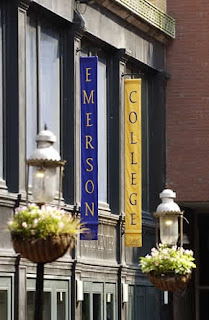FOUND IN TRANSLATION: Emerson Reading Series Presents
the Pains and Pleasures of the Impossible Art
by Michael T. Steffen
The Bright Family Screening Room drew nearly a full house last evening (3/12) for The Art of Translation, an evening in the Spring 2012 Emerson College Reading Series. And for good reasons. The topic is inexhaustibly interesting, and the participants, all familiar to the reading public, were generous, insightful and engaging.
Each of the panelists were bound to address the difficulties of translation—or, one step further, the impossibility of a foolproof translation respecting the original’s multiple texts (pretext, subtext, context, para-text…), its nuances along with its literal sense.
At the same time, each of them agreed the nail-biting, hair-pulling endeavor of making a best translation (poet Michael Palma said, “It takes a hell of a nerve to do this kind of thing”) was, and each of them used the word, “pleasurable.”
We were privileged to listen to DAVID FERRY at first lull us with talk about the inevitable differences between Latin and English, their syntactic estrangements, anapests and trochees, iambs and whatnot, only to burst into a passionate reading of Horace’s
“O navis, referent in mare te novi/fluctus, o quid agis!” (“O ship, o battered ship, the backward running waves/Are taking you out to sea again! O what to do?”)
Ferry spoke of the importance of “hearing” the cadences of urgency in the original, lingering on the Latin “fluctus, o quid agis!,” and suggested how he found his English equivalent in the exclamatory voice.
MICHAEL PALMA, who has won awards bringing modern Italian poets to readers of English as well as putting out a fully rimed translation of Dante’s Inferno, argued on behalf of the “poetry” of poetry, its musical qualities, its rhythms and resonances as being every bit as important as its images and literal meanings. Palma spoke of Robert Frost’s famous definition: “Poetry is what gets lost in translation”; yet held firm that “good translators are good poets first,” and citing the artistry of Richard Wilbur’s work in formal renditions of formal poems, commented that “a good translation must be able to stand as a good poem on its own.” He aptly illustrated his argument: When he paraphrases passages from Shakespeare for his students, they often ask him why Shakespeare hadn’t just written it out that way to begin with…
What reaction would we have to Ariel’s song, “Full fathom five thy father lies/Of his bones are coral made/Those are pearls that were his eyes…” if it had been written out as—
Your father’s corpse is gathering coral
about 8 or so meters underwater off the coast
and his faded eyeballs look sort of like pearls… ?
PETER FILKINS, a poet and translator of poetry in his own right, brought variety to the evening by discussing his work translating the novels of H.G. Adler, and “the unseen, invisible problems of translation.” It was eye-opening to hear Filkins point out the difficult task of “developing a voice” and maintaining “a consistent sense of tone and meaning” throughout a long narrative, while respecting the speaker’s unique character and point of view. With his colleagues, Filkins agreed that translation is full of thorns, yet pointed out that the problems of translation in particular made it a pleasurable pursuit.
SHEILA FISHER, a scholar and author on Medieval and Renaissance studies, including The Selected Canterbury Tales: A New Verse Translation, made the ironic admission that she “translated English into English.” It bothered her that Chaucer wasn’t getting as much attention in the classrooms as Shakespeare and Homer, believing this so due to the difficulties of Chaucer’s Middle English (“So pricketh hem Nature in hir corages”). Alone amid her panelists, it was Fisher’s task to keep the original as present as possible in the translation, which led her through no fewer quandaries. Yet like Filkins, Fisher revealed the delight she found in working such problems as “brood, a thikke knarre” out as “and broad, a thick-thewed thug.”
Many young faces were among the audience at The Paramount Center, aspiring writers and creditable students who were told how good a tool translation is in developing their own sense of the possibilities of language. David Ferry, elsewhere, has commented that the impossibility of getting a translation right has led him to much closer readings of texts than he would have had otherwise. And Sheila Fisher spoke of the “zillion tiny choices” translation confronts the writer with.
So the evening came—time flying in the fun we were having—to what seemed an abrupt halt. So much having been said, with so much left to say: the original referable dilemma of translation.
The Emerson College Spring 2012 Reading Series concludes with a reading by the poet CARL PHILLIPS on April 11 at 6:00 p.m. It will be held in the Bright Family Screening Room, 4th floor at The Paramount Center, 559 Washington Street in Boston.

No comments:
Post a Comment